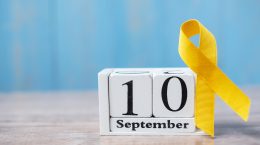Published on April 3, 2025
A video interview with Scott Geiselhart, Inspirational Speaker for First Responders, spreading hope for those struggling with PTSD, depression, and suicidal thoughts
 The featured video below is an interview between Jen Aliano, Director of GrassrootsHealth, and Scott Geiselhart, Inspirational Speaker for First Responders. As part of his program “I see in color again,” Scott travels the country speaking about his experience with Post Traumatic Stress Disorder (PTSD) as a first responder, and he shares his story as a message of hope for others struggling with PTSD, depression, and suicidal thoughts.
The featured video below is an interview between Jen Aliano, Director of GrassrootsHealth, and Scott Geiselhart, Inspirational Speaker for First Responders. As part of his program “I see in color again,” Scott travels the country speaking about his experience with Post Traumatic Stress Disorder (PTSD) as a first responder, and he shares his story as a message of hope for others struggling with PTSD, depression, and suicidal thoughts.
On top of dealing with severe depression and PTSD, Scott also endured a lifetime of sudden, severe muscle spasms—striking his chest, stomach, back, and all over his body. Desperate for answers, he visited a neurologist who tested his vitamin D levels—and the results were shocking. His level was very low at just 12 ng/ml. Getting his vitamin D level up not only chased away his muscle spasms, but helped him feel better overall. Scott shares how he experienced the effect of vitamin D and important co-nutrients on both his mental and physical health.
There is now much published research showing how vitamin D can impact muscle health, nerve function, and mental and emotional well-being. Whether you’re dealing with unexplained muscle pain or spasms, or struggling with low mood, severe depression or anxiety, it might be time to check your levels!
Could Your Mood Benefit from Improving Your Nutrient Levels?
Learn More About the Research Here
Watch the Video
Vitamin D Cuts Suicide and Self-Harm Risk Nearly in Half among US Veterans
Vitamin D supplementation resulted in a 64% reduced risk of suicide and self-harm among those presenting with vitamin D deficiency at baseline, and a 45-48% decreased risk overall
Key Points
- Research has found that 30-50% of veterans and service members have vitamin D levels below 20 ng/ml (50 nmol/L)
- A 2023 study among US Veterans found that vitamin D3 supplementation was associated with a 45% lower risk of suicide attempt and self-harm, while vitamin D2 supplementation was associated with a 48% lower risk; the higher the dose of vitamin D, the greater the risk reduction, with a greater risk reduction found among Black veterans compared to White veterans
- Analysis by baseline vitamin D level found a 64.1% reduced risk among those with a starting vitamin D level between 0-19 ng/ml who were then prescribed vitamin D3 compared to those who were not prescribed vitamin D3; each additional percentage point increase in average daily dose of vitamin D3 among this group was associated with a 13.8% reduction in risk, showing a dose-dependent relationship
- Other nutrients, including magnesium, zinc, and omega-3 fatty acids, have also shown to be beneficial in reducing the risk of depression and other mental disorders that have been associated with an increased risk of suicide
How Are Your Levels of Vitamin D and Other Important Nutrients?
Check your vitamin D, omega-3s, magnesium, and other important markers today as part of the vitamin D*action project!
Measure your:
- Vitamin D
- Magnesium PLUS Elements (including zinc, copper, selenium, mercury, cadmium and lead)
- Omega-3 Fatty Acids
- hsCRP (for Inflammation)
- HbA1c (for Blood Sugar)
- and more
Did you know that each of the above can be measured at home using a simple blood spot test? As part of our ongoing research project, you can order your home blood spot test kit to get your levels, followed by education and steps to take to help you reach your optimal target levels. Start by enrolling and ordering your kit to measure each of the above important markers, and make sure you are getting enough of each to support better health and wellbeing!
Start Here to Measure Your Levels






